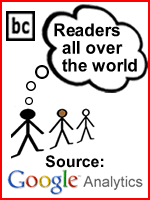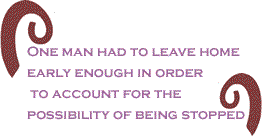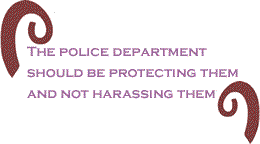The
history of African-Americans is one of great accomplishments
amidst the legacy of slavery and Jim Crow. That legacy follows
black people, and particularly black men, to this day. And
it is enough to make you red hot burning mad. Although some
are ready to usher in a new post-racial era of colorblindness,
it is clear that their efforts are grossly premature.
 In
America, race is a proxy for violence. Black men
are regarded as a criminal element, and racial profiling
is a practice that goes far beyond the justice system. It
is culturally ingrained and normalized. In the days of old,
when black people were not allowed to roam about unattended
or without permission, slave patrols policed the plantations
and hunted down fugitives. In
America, race is a proxy for violence. Black men
are regarded as a criminal element, and racial profiling
is a practice that goes far beyond the justice system. It
is culturally ingrained and normalized. In the days of old,
when black people were not allowed to roam about unattended
or without permission, slave patrols policed the plantations
and hunted down fugitives.
Similarly,
today, police sweep through communities of color, searching
for criminals. Any black man will do. And cops are searching
for drugs, not because black or Latino people use the most
drugs, but because of preference, of policy. Drug use among
white youth is greater than among youth of color, but you
will never find the police descend upon the nation�s college
campuses, round up those who �fit the description� and force
them to endure a demeaning arrest. After all, society views
them as the victims. Society has already decided
who should be designated as its criminals, even if the �suspects�
are as innocuous and upstanding as Henry Louis Gates - a
Harvard professor who was arrested for standing on his front
porch and attempting to enter his own home. But status is
not what counts, it�s all about race.
12
Angry Men: True Stories of Being a Black Man in America
Today is a new book which tells the first-person
accounts of black men who, like Professor Gates, have been
there. These twelve men were victims of racial profiling,
at the wrong place at the wrong time - which for a black
man could mean anywhere. Edited by Gregory S. Parks and
Matthew W. Hughley, 12 Angry Men contains a powerful
introduction by Harvard law professor Lani Guinier.
A
diverse group of people shares their encounters with the
police, including a New York Times reporter who was
detained while on assignment; Joe Morgan, a baseball legend
who was racially profiled at LAX; Joshua T. Wiley, a hip
hop artist who is constantly harassed by police, and Paul
Butler, a law professor and former federal prosecutor who
was stopped by the cops for living in a nice neighborhood.
Meanwhile, Byron Bain, a Harvard Law student was told by
his arresting officer that he must attend the school on
a �ball scholarship.� Bain compiled a tragically comical
�Bill of Rights for Black Men,� which includes as its first
and second amendments, �Congress can make no law altering
the established fact that a black man is a n****r,� and
�The right of any white person to apprehend a n****r will
not be infringed.�  Newly
arrived, foreign-born black men with British accents are
not immune from profiling and arrest. Even lawmakers are
not exempt, as Congressman Danny Davis recounts his experience
of racial profiling by the Chicago
police while driving home from his weekly radio show. Newly
arrived, foreign-born black men with British accents are
not immune from profiling and arrest. Even lawmakers are
not exempt, as Congressman Danny Davis recounts his experience
of racial profiling by the Chicago
police while driving home from his weekly radio show.
Throughout
the book, which is factual yet reads like a novel, these
twelve men share the humiliation of being told that you
are not allowed in a certain neighborhood, and the terror
that comes with having a gun pointed to your head. Told
where they can and cannot go and forced to produce their
identification, they compare their experiences to antebellum
slaves, black South Africans under apartheid, and Palestinians
in the Occupied
Territories. One man, who was stopped
at least once a month and as many as three, had to leave
home early enough in order to account for the possibility
of being stopped. Perhaps one of the more appalling cases
was of a boy in Prince George�s County,
Maryland, who
was accused of shoplifting by a police officer moonlighting
as a department store security guard. The guard made the
youth take off his shirt, go home and return with his sales
receipt to prove that he purchased it. The young man was
awarded $850,000
in damages by a federal jury.
Although
much of 12 Angry Men deals with the anecdotal and
the personal, the book also delves into the statistical,
including a report on racial profiling as practiced by the
New York Police Department (NYPD). According to the report,
which was released by the Center for Constitutional Rights
(CCR), race, not crime, drives police stops and frisks.
This is what blacks and Latinos have been saying for years.
And no matter what the neighborhood - low crime or high
crime, black, Latino, white or mixed, the results are always
the same.

For
example, 80 percent of the stops made by the NYPD between
2005 and 2008 were of African-Americans, who are only 25
percent of the city�s population. Whites, who make up 44
percent of the city�s population, were stopped only 10 percent
of the time. Over the past six years, nearly half of all
stops were made on the basis of a vague category called
�furtive movements,� while only 15 percent cited �fits relevant
description.� In over half of the stops, the officers noted
�high crime area� as an �additional circumstance,� even
in low crime areas.
�CCR
has been litigating against the NYPD�s racial profiling
and suspicionless stops-and-frisks since 1999. For its part,
during all this time, the police have claimed that they
stop people based upon reasonable suspicion that a crime
has been committed, based upon a description of a perpetrator,
and as an effective tool to get guns off the street,� Vincent
Warren, CCR�s executive director, recently told me. �The
significance of this report is that New York City must finally come to grips with its
racial profiling problem. There are hundreds of thousands
of innocent Black and Brown New Yorkers who daily suffer
the indignities of these illegal police tactics. And the
police department should be protecting them and not harassing
them.�
Reading
12
Angry Men: True Stories of Being a Black Man in America
Today made me angry, not because the subject matter
was brand new to me, but because it was far too familiar - not only as a black man, but also as a
human rights advocate who worked with police brutality victims
and their families back in the 1990s, and decided to go
to law school as a result.  Whether
or not racial profiling is a new subject for you, this book
should spark some discussions. And bringing this problem
into the light is the only way we can begin to fight it.
Black folks are not the only victims of racial profiling,
to be sure. But examining America�s
badge of slavery is a good place to start. Whether
or not racial profiling is a new subject for you, this book
should spark some discussions. And bringing this problem
into the light is the only way we can begin to fight it.
Black folks are not the only victims of racial profiling,
to be sure. But examining America�s
badge of slavery is a good place to start.
BlackCommentator.com Executive Editor, David
A. Love, JD is a journalist and human rights advocate based
in Philadelphia, is a graduate of Harvard College and the University of Pennsylvania Law School. and a contributor to The Huffington
Post, theGrio, The Progressive
Media Project, McClatchy-Tribune News Service,
In These
Times and Philadelphia
Independent Media Center. He also blogs at davidalove.com, NewsOne, Daily Kos, and Open Salon. Click here to contact Mr. Love.

|

